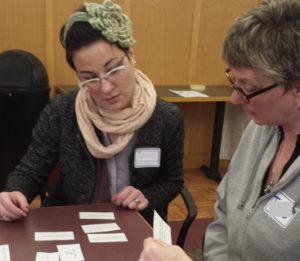- MN ABE Connect
- Archive
- Improving Teacher Expertise in Teaching Pronunciation: A Study Circle Model
 December 11, 2017
December 11, 2017
Improving Teacher Expertise in Teaching Pronunciation: A Study Circle Model
Andrea Echelberger, MN Literacy Council / ATLAS Study Circle FacilitatorI found the study circle extremely useful as a teacher. It transformed my teaching – completely. With ease I use word stress and other pronunciation skills in lessons all week.
– Spring 2017 Study Circle participant
Adult English language learners are hungry for pronunciation instruction that helps them to “crack the code” of speaking intelligible English. Research indicates that pronunciation instruction with adult learners is beneficial, yet many teachers feel they lack the knowledge and background to make sound instructional decisions, and shy away from explicitly teaching it.
This past spring, 12 adult ESL teachers decided to tackle the issue of pronunciation instruction in their classrooms head-on, and participated in the new Pronunciation Study Circle offered by ATLAS. Participants quickly discovered that they had common experiences, questions, and expertise to share. The study circle was designed and facilitated by Suzanne McCurdy and Andrea Echelberger, who were both thrilled to have the opportunity to work on an in-depth pronunciation training initiative.
Study Circle Components
 During their time together, the participants met three times in face-to-face meetings where they had the opportunity to learn from the facilitators and from each other. Prior to each meeting, participants read research on pronunciation instruction, reflected on guiding questions, tried out pronunciation activities in their classrooms, and observed one another teaching. During the meetings, participants actively discussed the readings and tasks and examined how the research and explorations could inform their classroom practices. Some of the other topics that were explored during the study circle were:
During their time together, the participants met three times in face-to-face meetings where they had the opportunity to learn from the facilitators and from each other. Prior to each meeting, participants read research on pronunciation instruction, reflected on guiding questions, tried out pronunciation activities in their classrooms, and observed one another teaching. During the meetings, participants actively discussed the readings and tasks and examined how the research and explorations could inform their classroom practices. Some of the other topics that were explored during the study circle were:
- Analyzing the speech samples of adult ESL students
- Setting priorities for pronunciation instruction
- Building meta-language around pronunciation features
- Observing an activities workshop to facilitate classroom instructional ideas
Study Circle Outcomes
In order to evaluate the effectiveness of the study circle, the facilitators paired up with Betsy Parrish from Hamline University. Together they conducted research and gathered information from the participants, including pre- and post-study circle surveys, language logs, and a delayed focus group where participants could talk about their experiences. The responses were very positive overall; some of the key findings included:
- A shift away from a focus on segmentals (the individual sounds of the language) to including surprasegmentals (such as stress, pausing, and intonation) and other phonological phenomena (such as final consonant deletion)
– Focus on the stuff that’s going to give them the most bang for their buck. Not so much the “th” or the minimal pairs.
- Focus on intelligibility and prioritizing pronunciation needs
– Everyone’s going to have an accent…what really matters is intelligibility…
– Recognize the majority problem area. So finding out what is the area that the majority of my students have a problem with [and that] will help as many students as possible.
- Building learner awareness of pronunciation breakdowns
– “They’re becoming aware. They are aware. It’s crazy. They’re aware. They’ll recognize it now. I’ll say did you say no? Or nose? Oh yeah oh nose. Just that piece of it is a huge change that regularly now they’ll realize that now they’re not saying that last sound.”
- Integrating pronunciation routines in their classes
– “I have scheduled in about 15 minutes every day where I do something with pronunciation.”
- Impact of research on beliefs, attitudes and practices
– “The research was really a very important foundation that kept it real for me, and vibrant and made me want to continue on.”
Upcoming Study Circle Opportunities
ATLAS is excited to announce that the Pronunciation Study Circle will be offered again in the winter of 2018! The face-to-face meetings will be held from 1:30-4:30 on February 16, March 2, and March 16 at Hamline University. If you are interested in participating in the study circle, you can get more details on the ATLAS website. Registration will open the week of January 15, and space is limited to 12 participants – so sign up quickly!
Newsletter Signup
Get MN ABE Connect—the official source for ABE events, activities, and resources!
Sign UpArticle Categories
- ABE Foundations/Staff Onboarding
- ACES/Transitions
- Adult Career Pathways
- Assessment
- CCR Standards
- Citizenship
- COVID-19
- Cultural Competency
- Digital Literacy/Northstar
- Disabilities
- Distance Learning/Education
- ELA
- Equity/Inclusion
- ESL
- HSE/Adult Diploma
- Listening
- Math/Numeracy
- Mental Health
- Minnesota ABE
- One-Room Schoolhouse/Multilevel
- Professional Development
- Program Management
- Reading
- Remote Instruction
- Science
- Social Studies
- Speaking/Conversation
- Support Services
- Teaching Strategies
- Technology
- Uncategorized
- Volunteers/Tutors
- Writing